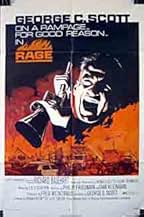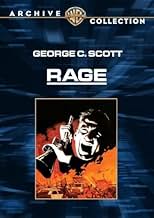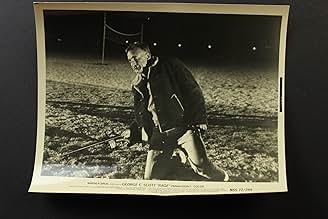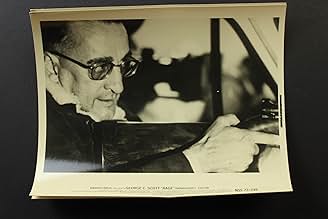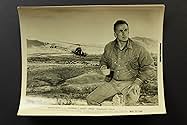AVALIAÇÃO DA IMDb
6,3/10
1,5 mil
SUA AVALIAÇÃO
Adicionar um enredo no seu idiomaAn accidental nerve gas leak by the military kills not only a rancher's livestock, but also his son. When he tries to hold the military accountable for their actions, he runs up against a wa... Ler tudoAn accidental nerve gas leak by the military kills not only a rancher's livestock, but also his son. When he tries to hold the military accountable for their actions, he runs up against a wall of silence.An accidental nerve gas leak by the military kills not only a rancher's livestock, but also his son. When he tries to hold the military accountable for their actions, he runs up against a wall of silence.
- Direção
- Roteiristas
- Artistas
- Direção
- Roteiristas
- Elenco e equipe completos
- Produção, bilheteria e muito mais no IMDbPro
Avaliações em destaque
George C. Scott has only one competitor as a player who can do a better Rage than him and that is Kirk Douglas. It's kind of fitting that one of them have on his list of credits a film entitled Rage.
I remember seeing this in the theater back in 1972 and it was one of those first films that showed the American government as something less than wise and benevolent. All the more so because Scott is one of those middle American characters who is a true believer in the Stars&Stripes and all it stand for.
Scott is a widower who owns a small sheep ranch and he and his son Nicholas Beauvy who is better known as one of the young men mentored by John Wayne in The Cowboys. As they decide to camp out with the sheep an army helicopter is flying in their vicinity. The next day Beauvy is very sick and Scott takes his son to a nearby hospital.
Where all kind of people from the military as represented by Dr. Martin Sheen and the Public Health Service as represented by Barnard Hughes are very interested in his case. Scott is admitted too and the smell of cover-up proves too much for Scott's personal physician Richard Basehart.
I can't go beyond this other than Scott's given an unbelievable amount of justification for declaring a personal war on the army and the government it fights for.
Scott hits several levels with his performance. His Rage and anger to be sure, but it's all mixed in with both sorrow and betrayal. Director Scott did well by actor Scott.
In many ways Rage is a film for today's audience and I recommend it highly.
I remember seeing this in the theater back in 1972 and it was one of those first films that showed the American government as something less than wise and benevolent. All the more so because Scott is one of those middle American characters who is a true believer in the Stars&Stripes and all it stand for.
Scott is a widower who owns a small sheep ranch and he and his son Nicholas Beauvy who is better known as one of the young men mentored by John Wayne in The Cowboys. As they decide to camp out with the sheep an army helicopter is flying in their vicinity. The next day Beauvy is very sick and Scott takes his son to a nearby hospital.
Where all kind of people from the military as represented by Dr. Martin Sheen and the Public Health Service as represented by Barnard Hughes are very interested in his case. Scott is admitted too and the smell of cover-up proves too much for Scott's personal physician Richard Basehart.
I can't go beyond this other than Scott's given an unbelievable amount of justification for declaring a personal war on the army and the government it fights for.
Scott hits several levels with his performance. His Rage and anger to be sure, but it's all mixed in with both sorrow and betrayal. Director Scott did well by actor Scott.
In many ways Rage is a film for today's audience and I recommend it highly.
While camping out, a Wyoming sheep rancher and his son are accidentally sprayed with a secret poison. The boy dies while the military covers up its mistake, enlisting civilian personnel in the cover-up. But will the father find out, and if so, what will he do.
It's important to keep in mind that the screenplay is based on a true 1968 occurrence. The Pentagon covered up poisonous contamination of several thousand sheep in Utah, and only admitted it after overwhelming evidence. I assume they were wary of being seen experimenting with poisonous chemical at a time when the Vietnam War was going badly. The movie itself is very methodical. The first part dealing with the cover-up shows how deception is spread among medical and military professionals. Surprisingly, however, no higher justifications such as national security are cited. It's more like an embarrassment than a security breach.
Anyway, Scott really low-keys it throughout, being good-citizen cooperative even as he's fed one lie after another about his son. Even after he finds out the truth, his rage is more intense than histrionic. I guess I was expecting him to explode in the scary way that only he can. Apparently, the actor wasn't happy with his performance (TCM), blaming it on his divided roles as both director and lead performer.
All in all, the movie's like a slow fuse being lit until it finally goes off. Just how sane Logan (Scott) is during those climactic moments is, of course, anybody's guess. Considering what's happened to him, his actions are understandable, if not excusable (innocents die). At the same time, the lessons are, if anything, more relevant now than then, especially with the rise of our national security state and its mass surveillance program.
(In passing—this is one of the few films I've seen to actually portray death throes as the person expires. Kudoes to Scott for including such a disturbing detail that traditional Hollywood avoided like the plague. More of that and audiences might take a different view of movie violence.)
It's important to keep in mind that the screenplay is based on a true 1968 occurrence. The Pentagon covered up poisonous contamination of several thousand sheep in Utah, and only admitted it after overwhelming evidence. I assume they were wary of being seen experimenting with poisonous chemical at a time when the Vietnam War was going badly. The movie itself is very methodical. The first part dealing with the cover-up shows how deception is spread among medical and military professionals. Surprisingly, however, no higher justifications such as national security are cited. It's more like an embarrassment than a security breach.
Anyway, Scott really low-keys it throughout, being good-citizen cooperative even as he's fed one lie after another about his son. Even after he finds out the truth, his rage is more intense than histrionic. I guess I was expecting him to explode in the scary way that only he can. Apparently, the actor wasn't happy with his performance (TCM), blaming it on his divided roles as both director and lead performer.
All in all, the movie's like a slow fuse being lit until it finally goes off. Just how sane Logan (Scott) is during those climactic moments is, of course, anybody's guess. Considering what's happened to him, his actions are understandable, if not excusable (innocents die). At the same time, the lessons are, if anything, more relevant now than then, especially with the rise of our national security state and its mass surveillance program.
(In passing—this is one of the few films I've seen to actually portray death throes as the person expires. Kudoes to Scott for including such a disturbing detail that traditional Hollywood avoided like the plague. More of that and audiences might take a different view of movie violence.)
I've been looking forward tremendously to "Rage" and pretty much knew for certain that I would like it, even though the film is rather obscure, unsung and quite difficult to come across. It certainly isn't a hidden gem or undiscovered classic, but I have a personal weakness for "rural" and politically themed drama/thrillers from the early seventies period; especially when a few interesting names are involved. In this case, it's one of the rare movies that George C. Scott directed himself, next to also starring in the lead role. Scott stars as Dan Logan, a widower and sheep herder living on an enormous ranch in the secluded countryside of Wyoming together with his teenage son Chris. During a crystal clear summer night, father and son decide to camp on their estate, but the next morning Dan finds his son in a critical unconscious condition. At the local hospital, Major Holliford already knows that they were both accidentally contaminated by a new type of military chemical/nerve gas due to a leak in the tank of a plane. The whole situation is covered up and handled with deep secrecy; so much even that Dan Logan isn't informed about his own son's death. Although suffering from the symptoms himself, Dan escapes from the hospital and sets out on a violent journey to unravel the ugly truth. The subject matter of "Rage" is truly compelling and also quite unsettling, since the events don't seem too far-fetched or unimaginable at all, but it doesn't result in the most spectacular action movie. The entire first hour is mainly talkative and slow, with protagonist George C. Scott lying sedated in a hospital bed and military doctor Martin Sheen professionally misleading Logan's regular physician and the rest of the medical staff. The final half hour is more lively and exciting, but it nevertheless remains somewhat unsatisfying. Dan Logan goes out on a furious John Rambo type of quest for vengeance, complete with stealing dirt bikes and setting off explosives, but eventually never achieves his mission. He kills a bunch of people, but they are all innocent marionettes (like policemen, security guards and even a playful ginger kitten!) while the real military harm-doers remain untouchable. As the director, Scott most certainly demonstrates that he's able to insert stylish little details and visionary touches, particularly through unexpectedly odd camera angles and enchanting slow-motion shots. "Rage" certainly isn't fundamental viewing, but still comes warmly recommended in case you enjoy conspiracy thrillers and/or the works of George C. Scott.
Almost everything in this film is predictable. The failure of the military to take responsibility, the complicity of local physicians and authorities, and a complete cover-up by the military brass; all of it rather predictable.
Despite these types of nerve gas weapons being outlawed by the Geneva Convention, they still, of course, still exist, within various nefarious military installations dedicated to this type of warfare. The military does not particularly care what the Geneva Convention has to say about these weapons; all is fair under the guise of National Defense.
What transpired in the film, of course, was a tragedy, but the result was inevitable. Scott does a good job acting, and an adequate job of directing. However, the screenplay is so absolutely depressing from beginning to end, that even a raging George C Scott cannot save it. It is this predictability that ruins any chance of the film having elements like suspense or tension. Interesting to watch for Scott's performance.
Despite these types of nerve gas weapons being outlawed by the Geneva Convention, they still, of course, still exist, within various nefarious military installations dedicated to this type of warfare. The military does not particularly care what the Geneva Convention has to say about these weapons; all is fair under the guise of National Defense.
What transpired in the film, of course, was a tragedy, but the result was inevitable. Scott does a good job acting, and an adequate job of directing. However, the screenplay is so absolutely depressing from beginning to end, that even a raging George C Scott cannot save it. It is this predictability that ruins any chance of the film having elements like suspense or tension. Interesting to watch for Scott's performance.
George C. Scott plays a rancher who, along with his son, is exposed to a chemical weapon due to a mistake the Army made. However, instead of being up front about it, the military places doctors on the case (Barnard Hughes and Martin Sheen) who lie continually to the man...not letting him know that his son had died and that his prognosis is grim. When he does discover they've been lying to him, he decides to go out in a blaze of glory...with a series of violent attacks in order to try to get the faceless military to pay for their crimes.
While the plot is good, the execution isn't. It's simply a guy going Rambo and killing a few people in a somewhat pointless rampage. The overall feeling is grim and awful and it's a movie no one can enjoy. Now I am NOT saying a film about chemical weapons need to be fun....but it should have more depth than this. Violent and depressing.
While the plot is good, the execution isn't. It's simply a guy going Rambo and killing a few people in a somewhat pointless rampage. The overall feeling is grim and awful and it's a movie no one can enjoy. Now I am NOT saying a film about chemical weapons need to be fun....but it should have more depth than this. Violent and depressing.
Você sabia?
- CuriosidadesThe story was inspired by and incident at the Dugway Proving Grounds in Utah on 13 March 1968. The U.S. Army conducted tests of a nerve agent chemical weapon, later revealed to be VX nerve gas, including spraying it from a jet aircraft. Between 3,000 and 6,000 sheep were reportedly killed. The Army did not admit fault for the incident until 1998.
- Erros de gravaçãoAlthough most of the officers are wearing the Vietnam Campaign and Vietnam Service ribbons, none of them wears a patch on their right shoulder depicting the unit they served with in Vietnam. The wearing of such "combat patches" is customary in the U.S. Army.
Principais escolhas
Faça login para avaliar e ver a lista de recomendações personalizadas
- How long is Rage?Fornecido pela Alexa
Detalhes
- Data de lançamento
- País de origem
- Idioma
- Também conhecido como
- Sed de Venganza
- Locações de filme
- Benson, Arizona, EUA(Hospital scenes, Marie's truck stop sign)
- Empresas de produção
- Consulte mais créditos da empresa na IMDbPro
Contribua para esta página
Sugerir uma alteração ou adicionar conteúdo ausente



